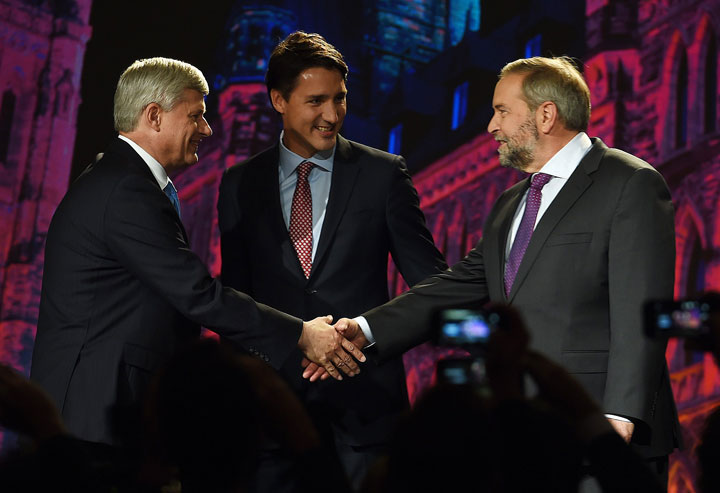Globalnews.ca will be live streaming the French language debate Thursday at 8 p.m. ET.

There are less than four weeks and only four debates until one of the longest campaigns in Canadian history comes to an end.
In past elections, the parties generally agreed to take part in just two debates, both hosted by the major television networks. This time, it wasn’t so easy.
Stephen Harper refused to take part in the English language consortium debate (but said yes to the French debate), saying the party would take part in five debates “which is a record for federal campaigns in our country.”
There’s been two debates so far; the Macleans debate and the Globe and Mail debate. Approximately 3.8 million Canadians tuned in for the Macleans debate, and, according to YouTube, approximately 400,000 people have watched a portion of the Globe and Mail debate.
Polling conducted by Ipsos following the first two debates found that roughly 20 per cent of Canadians tuned in.
READ MORE: Here’s what to expect from this week’s French-language debate
But there are more debates this time around than in previous elections and still four more to go. There were only two in 2011, but approximately 11 million viewers tuned in for the English-language debate.
Part of the reason for that disparity is that the 2011 debate pre-empted whatever was supposed to be on television that night. This time around, if people were planning on watching Global, CTV, or CBC – they didn’t have to watch the debate.
Ipsos polling conducted after the 2011 debates found roughly 14 per cent of voters said they made up their minds following the debate – and right now there’s still a lot of undecided voters.
How the new debates change the game
As of Sept. 24, the polls are close with some predicting a three-way race with no clear leader, and others suggesting Stephen Harper is closing in on majority territory.
So with such a close race, is this new debate structure changing the campaign? University of Toronto politics professor Nelson Wiseman says while some might argue that more debates means more people are engaged, that’s not always the case.
“The people that watch debates are more likely to be political junkies,” he said. “Not only that but the people who watch debates are already more likely to be predisposed to support one party or another.”
Tim Powers, a former Conservative strategist and current vice-chairman of Summa Strategies, said that while it’s true political junkies make up a good portion of the debate audience, for others it depends how much time they devote to actually watching.
For those that choose to watch Survivor or a football game instead of the debate, they are more likely to be swayed with the distilled versions of the debate on the news, and the answer to the question ‘who won?’
“They’ve seen the highlights, they don’t need to see the rest,” Wiseman said. “That’s what they think.”
WATCH: Miss the federal leaders debate on the economy? Here’s your three-minute recap.
In-depth policy discussion doesn’t always make it through the milieu of television or print coverage of debates which can focus — rightly or wrongly — on who had the best one-liner, or who won. And campaign strategists take that into consideration when choosing which debates to participate in, Powers said.
“Candidates all sort of weigh that. What’s the outreach benefit of this, who haven’t I touched, do I want to touch those people? You’re not going to hear much in terms of new messages,” Powers said.
“And rarely do you get the Mulroney moment, the Ignatieff moment, and when you do, it’s less what happens in that moment in the debate, and it’s the after coverage that turns that into something bigger than it was perhaps at the time.”
Who has the most to gain?
But in most cases, according to the Ipsos polling, the impact isn’t massive – if everyone performs as expected.
According to Ipsos, support for Jack Layton and the NDP shot up following the 2011 consortium debate and continued through election day when the NDP won Official Opposition status. Before the debate, only 13 per cent of respondents to Ipsos polls thought Layton would win. Afterwards, 25 per cent of people thought he won.
Though it was still well behind the 42 per cent of respondents who thought Harper won, it was well ahead of expectations.
And that’s why Powers thinks Trudeau has the most to gain or lose with more debates – including Thursday’s French leaders debate, which he says, could be momentum-shifting.
“What’s interesting about tonight is you’ll probably have a bigger audience because it is a significant debate in Quebec, there’s a lot at stake in Quebec for all of the parties and the impact on that in the rest of the country. So Quebeckers, my experience is, tend to pay attention to these things.”
And expectations for Trudeau are lowest among the three leaders so if he does moderately well, he stands to gain.
“If the criticism from both the Conservatives and the NDP is, and its borne out in polling that he’s not up for the job, and he doesn’t suck at any of these debates, and the expectations are so low, then maybe that assuages some of the voters that might not lean Liberal but may now lean Liberal because Trudeau, based on the coverage they’re seeing, not even watching the debate, has done better than people told them he would do.”
Moreover, much of the NDP’s base in located in Quebec and if Mulcair stumbles Thursday, it may convince some people strictly looking to defeat Harper to shift their support from Mulcair to Trudeau.
– With files from The Canadian Press





Comments